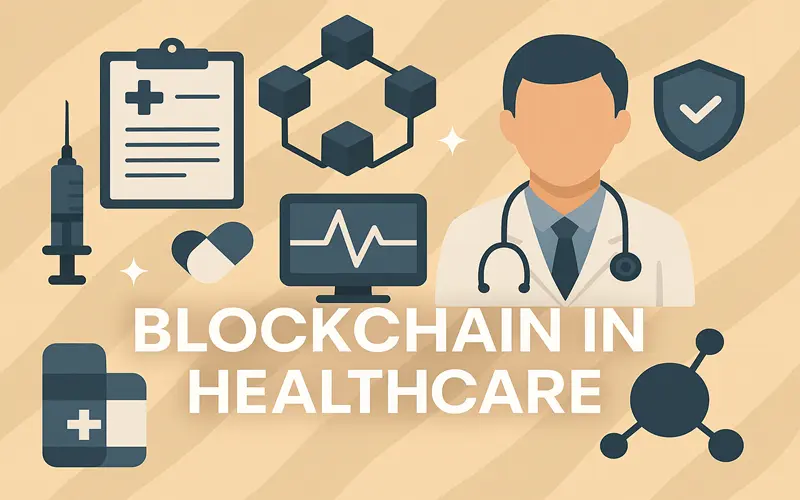In today’s fast-moving digital world, the healthcare industry is exploring new technologies to improve patient care, secure sensitive data, and make systems work faster and smarter. One of the most talked-about technologies making waves is blockchain in healthcare.
What is Blockchain?
Before we dive into how blockchain in healthcare works, we need to understand what blockchain is.
Blockchain is a digital ledger — like a notebook — that records information in a secure and unchangeable way. Every time something happens (like a new medical test or a patient visit), a new “block” of data is added to the chain. These blocks are linked together in order and can’t be changed once they’re added. This makes it very hard for hackers or anyone to cheat the system.
It’s like writing your homework in pen and storing it in a locked, shared notebook that everyone can see but no one can erase or change.
Read More: money6x .com
Why Is Blockchain Important in Healthcare?
In healthcare, information like patient records, test results, and billing data is very sensitive. Right now, many hospitals store this information in their own systems. This can make it hard to share important medical data between different doctors or hospitals. Also, these systems can be hacked or have errors.
Using blockchain in healthcare helps solve these problems. It offers a secure, clear, and easy way to manage and share medical information.
Benefits of Blockchain in Healthcare
Let’s look at some important ways blockchain in healthcare is making a difference:
1. Better Patient Data Security
Medical data needs strong protection. With blockchain, patient records are stored in a safe and encrypted format. No one can change the data without permission. It also keeps track of who accessed the data and when. This means fewer chances of data leaks or identity theft.
2. Improved Data Sharing Between Doctors
Sometimes, patients see different doctors in different places. With blockchain, all doctors can access the same patient data quickly and safely, without needing to call each other or send emails. This helps in better treatment and faster decisions.
3. Lower Healthcare Costs
Right now, there’s a lot of paperwork in hospitals. Staff spend time checking records, insurance claims, and payments. Blockchain automates many of these tasks, saving time and money.
4. Faster Medical Research
Researchers often need patient data to study diseases and create new treatments. But getting this data is slow and hard. With blockchain, patients can choose to safely share their data with researchers while keeping their identity private.
5. Supply Chain Tracking
Hospitals use many medical products and drugs. Sometimes fake drugs get into the system. Blockchain can track each product from the factory to the hospital, making sure it’s real and safe.
6. Smart Contracts in Healthcare
Smart contracts are digital rules that work on their own. For example, a smart contract can make an insurance payment happen automatically when the right documents are uploaded. This removes delays and makes the system fair for everyone.
Real-World Examples of Blockchain in Healthcare
Some healthcare organizations have already started using blockchain:
-
Medicalchain allows patients to control and share their health records.
-
BurstIQ provides safe sharing of big health data for research.
-
PharmaLedger tracks medicine from the maker to the patient.
These are just a few examples showing how blockchain in healthcare is already helping people in real life.
Challenges of Using Blockchain in Healthcare
Even though blockchain sounds great, there are some problems to solve:
1. Technology is Still New
Not all hospitals or clinics understand how blockchain works. It takes time to teach people and set up the system.
2. High Setup Costs
Starting a blockchain system can be expensive. It needs skilled workers and strong computers.
3. Privacy Concerns
Even though blockchain is safe, there are questions about how much data should be stored and who should have access.
4. Rules and Laws
Every country has different rules about patient data. Blockchain systems must follow all these laws, which can be hard to manage.
The Future of Blockchain in Healthcare
Even with a few bumps in the road, the future looks bright for blockchain in healthcare. Here are some ways it may grow:
-
Patients will own their health records and can share them whenever needed.
-
Insurance claims will be processed in minutes, not weeks.
-
Fake medicines will become a thing of the past.
-
Research will be quicker and more accurate thanks to better data sharing.
Experts believe that over the next 5 to 10 years, more hospitals, companies, and governments will adopt blockchain to make healthcare smarter, safer, and more personal.
How Will It Affect Patients Like You?
ne you get sick while on vacation. Right now, it’s hard for doctors in another city or country to see your medical records. With blockchain, your complete health record could be shared safely and instantly — with your permission. This helps the doctor treat you better and faster.
Or think about health insurance. You won’t need to fill out endless forms. Smart contracts on blockchain will do it for you.
That’s the power of blockchain in healthcare — it puts you in control and helps everyone in the system work together more easily.
Final Thoughts
Blockchain in healthcare is not just a buzzword. It’s a strong new tool that can change how we care for people, protect personal information, and manage medical services. While it’s still growing and improving, its impact is already clear.
If hospitals, doctors, and patients all work together to understand and adopt this technology, we can make healthcare simpler, safer, and more trusted for everyone.
FAQs
1. What is blockchain in healthcare?
Blockchain in healthcare means using blockchain technology to store, share, and protect patient and medical data in a safe and easy way.
2. How does blockchain make healthcare better?
It improves patient safety, lowers costs, prevents fraud, makes data sharing easier, and speeds up many healthcare processes.
3. Is my data safe with blockchain in healthcare?
Yes, blockchain uses strong security to keep your data private. Only people with permission can access or see it.
Read More: dgmnews.com

